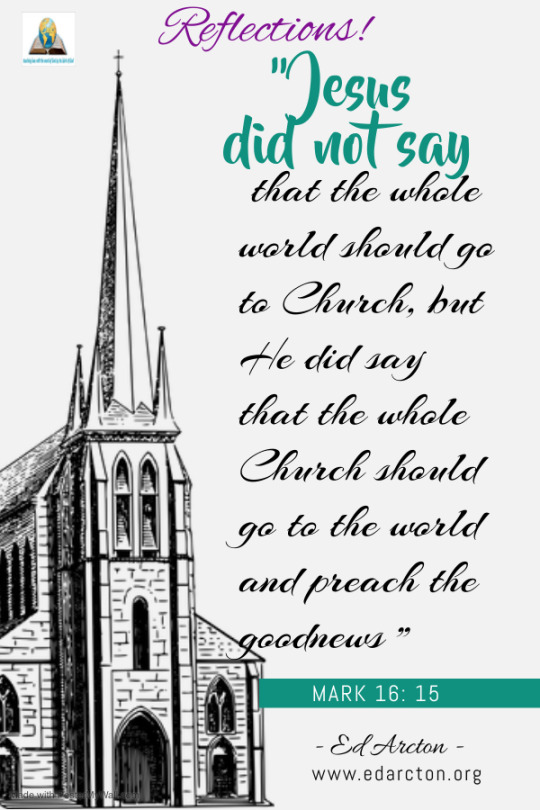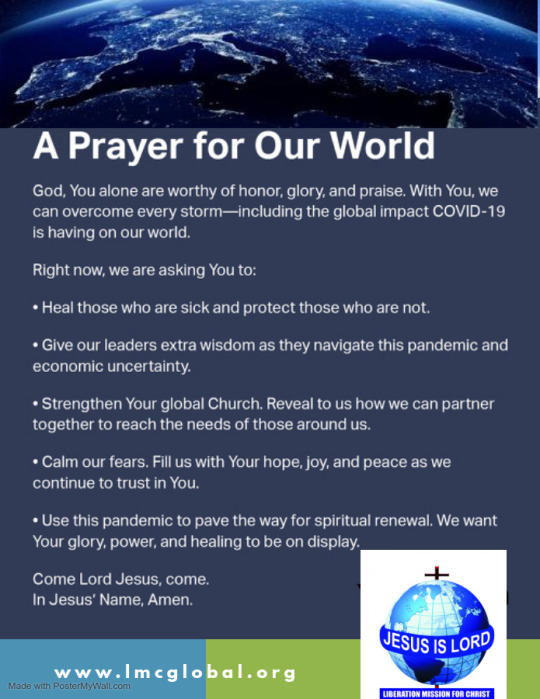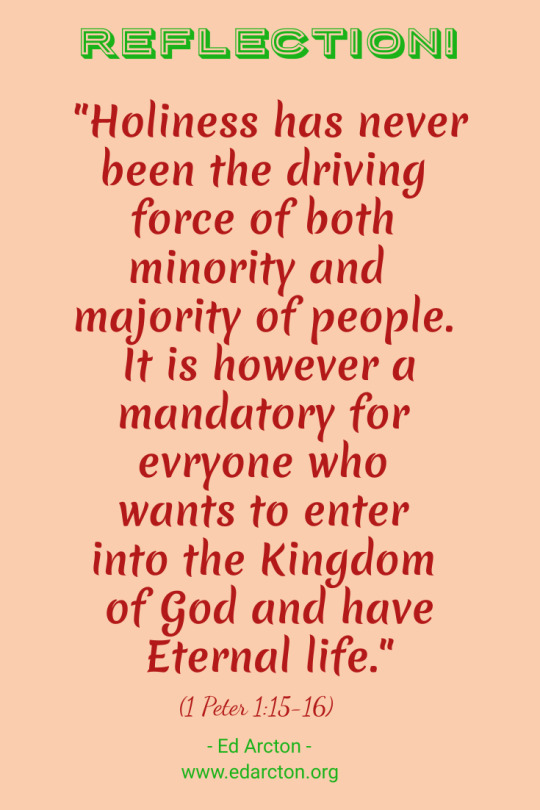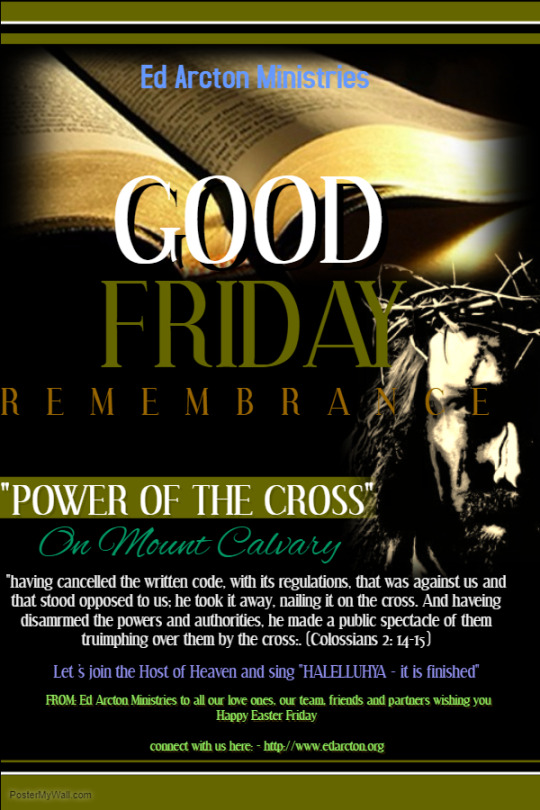Text

1 note
·
View note
Text

0 notes
Photo

Let's Pray for the Nations of the Earth. God rules the affairs of men and HE establish HIS counsel over all and in ALL.
0 notes
Photo

Ed Arcton Ministries turned 5 today!
#tumblr birthday#tumblr milestone#Grace of God#Love of God#Peace of God#Goodness of God#https://edarcton.org#Thank You God
0 notes
Text
Sing the Song the Holy Spirit Gives You

Scripture: Acts 16:20-34
It was the end of the day on Valentine’s Day, several years ago. I had just finished up with a youth group gathering at the church inside of the premises where I was serving then, and I was back in my office getting ready to head home when my phone rang. It was my friends Mom is speaking here!
Just from the way she said hello, I knew something was wrong. “Franklyn,” she said, “Grandma Ruth had a stroke today. I’m with her in the hospital.”
I sat down in my chair and took a breath. “How bad is it, Mom?”
“We don’t know yet. But so far, it’s not too good.”
After we hung up, I must have packed up my things, and shut down my computer, and turned off the lights, and closed the door, though I don’t remember doing any of those things. What I do remember is being in the car, driving down in the dark, with my eyes brimming and my throat constricted, trying not to cry so I could stay on the road.
And then, out of nowhere, a song came to my mind and to my lips. It was Song the Holy Spirit gives me that moment setting of the 23rd Psalm, the one that goes like this,
The Lord is my shepherd, I have all I need, he makes me lie down in green meadows. Beside the still waters he will lead…
I sang that song to myself over and over as I drove down the highway. Sometimes I mixed up the stanzas. Sometimes my voice cracked, or I had to stop in the middle of a line. But in the music, somehow the presence of Jesus came into that moment. Somehow God’s very heart came into that old Toyota and freed me from the boa constrictor of fear that had wrapped itself around my chest. And although I was still afraid, still worried, still sad, I was no longer captive to it, because I was filled up by the tenderness of the One who turns toward, not away from, suffering—the One whose heart is always the first one to break.
Over the next few days, we learned how bad it was for grandmother. She was weakened on one side to the point where walking was impossible, so she was confined to a wheelchair or to her bed. But much worse than the physical effects were the neurological ones. She lost the ability to talk, to express herself in anything more than moans. It was hard to tell, since she couldn’t use her words, but we think she could still understand us; she had enough cognition left to know what she had lost.
For months, she lived like that, trapped in a body that was tenaciously, persistently alive. We would sit and talk with her; we would hold her hand; we would read to her from books she used to enjoy. But by far the best thing we did for her, especially as the end finally, mercifully, came, was sing. We would take out her hymnal and sing:
For the beauty of the earth, for the splendor of the skies…
And: Be thou my vision, O God of my heart…
And: Abide with me, fast falls the eventide…
And: My life flows on in endless song, above earth’s lamentation…
Sometimes we mixed up the stanzas. Sometimes our voices cracked, or we had to stop in the middle of a line. But in the music, somehow the presence of Jesus came into that moment. Somehow God’s very heart came into that nursing home room and freed her, freed us, from the heavy shroud of fear that pressed down upon us. And although she was still suffering, although we were still heartbroken, we were no longer captive to it, because we were surrounded by the strength of the One whose body was broken, but whose spirit could not be tamed—the One whom even death could not contain.
I think it must have been like that for Paul and Silas, centuries ago and worlds away. They had been beaten and thrown into prison, not for the first time. They were put, the story tells us, in the innermost cell—where, presumably, the darkness was deepest and escape was furthest away. They were trapped, shackled, surely afraid. And then, out of nowhere, a song came to their minds and to their lips. They sang a hymn and found themselves liberated.
They might have mixed up the stanzas; their voices might have cracked. But in the music, somehow the presence of Jesus came into that moment. Somehow God’s very heart came into that jail cell and freed them from the chains that bound them. And although they were still in danger, still fearful, still under the thumb of the powers that be, they were no longer captive to it, because they were strengthened by the courage of the One who faced down the worst that this world could do, and turned it into love.
This is part of why we sing hymns, spiritual songs in church, in our homes and on the our way out and way back, so that they will get into our bones, into our ears, into our souls—so that they will find their way to our minds and to our lips when we need them most.
So that when we feel alone, we will find ourselves singing, Precious Lord, take my hand, lead me on, help me stand…
So that when we feel abandoned, we will find ourselves singing, Great is thy faithfulness, O God, Creator…
So that when we feel uninspired, we will find ourselves singing, Spirit of the Living God, fall afresh on me…
So that when we feel afraid, we will find ourselves singing, Joyful, joyful, we adore thee, God of glory, Lord of love…
And in the music, somehow the presence of Jesus will come into that moment. Somehow God’s very heart will come into that dark place, into that sticky spot. And although we may still be in the midst of struggle, we will no longer be captive to it, because we will be upheld by the mercy of the One who endured the desertion at Gethsemane, the loneliness of the cross, and somehow still poured forth forgiveness and light and life.
Here’s the thing about the presence of Jesus. Here’s the thing about the very heart of God. Christ is not a private commodity. God’s heart is not something we can keep to ourselves. Did you notice in our reading that when Paul and Silas sang, it wasn’t only the two of them who were freed from prison by the power of their song, but everyone around them, too? Like those two apostles, when we sing of God’s faithfulness, God’s justice, God’s love, we bring courage and freedom and hope not only to ourselves, but to those around us, too. When the presence of Jesus comes into that moment, when God’s very heart comes into our midst, Christ brings new life not only to us, but to our households, to our communities, to our world.
And here’s another thing about the presence of Jesus. Here’s another thing about the very heart of God. Christ is not bound by the laws of time and space. God’s heart can be in many places at once, in all times at the same time. And so, when we sing, we do not sing alone. We sing in the strong company of our foremothers and forefathers, our sisters and brothers in faith, who have sung these songs before us. We sing in the strong company of the church in every time and every place. We sing in the strong company of all the saints—the dead, and the living, and those yet to come—the entire company of faithful people everywhere.
Especially today, especially on this day and as we walk the road to the Church on Sundays, we sing in the strong company of the great cloud of witnesses. We sing with Paul and Silas in that jail cell. We sing with Moses and Miriam on the bank of the Red Sea, celebrating their escape from slavery into freedom. We sing with King David, who danced before the Lord. We sing with the Psalmist, who sang so many songs that speak the truths of our hearts. We sing with Mary, mother of Jesus, who sang a revolutionary love song to her baby boy. We sing with the early churches, gathered in kitchens and living rooms to break bread and praise God together.
And not only them. We sing with John Wesley, who wrote so many of the songs in our hymnal. We sing with Martin Luther King and his colleagues, who sang of freedom as they faced down dogs and nightsticks and fire hoses. We sing with Billy Graham and our Grandma Ruth, playing her piano with those old, arthritic fingers. We sing with your loved ones who have gone before, who rejoice with us now from upon a farther shore and in a greater light.
We sing with the whole cloud of witnesses, with the whole communion of saints, as we proclaim these gospel truths: that our lives and our deaths are precious to God; that we are connected in ways deeper than we can possibly know; that we are bound to one another and to God by a love that is stronger than fear, stronger than hate, stronger even than death itself.
And as we sing, somehow, in the music, the presence of Jesus comes into that moment. Somehow God’s very heart comes into the world and sets us all free. Somehow we are swept up in the breath-taking, life-changing harmony of the love of God—the love without which we cannot survive; the love with which all things are possible.
0 notes
Photo

Wishing you Happy New Year.
Visit Homepage >> Ed Arcton Ministries
0 notes
Link
0 notes
Video
vimeo
Sermon: The Fire of Evangelism
Sermon Outline:
INTRODUCTION:
God has two ways of destroying His enemies. One is the old school method—the fire coming down out of the sky method. This is the method that leaves a smoking crater. But the other is a far more glorious method, and that is His method of destroying enemies by turning them into friends. That is a far more wonderful destruction indeed. In order to accomplish the former, all He had to do was exercise His power. But to accomplish the latter, His Son had to die.
THE TEXT:
“The vision of Obadiah. Thus saith the Lord God concerning Edom; We have heard a rumour from the Lord, And an ambassador is sent among the heathen, Arise ye, and let us rise up against her in battle. Behold, I have made thee small among the heathen: Thou art greatly despised. The pride of thine heart hath deceived thee . . .” (Obadiah 1-21).
BACKGROUND OF THE TEXT:
The most likely setting for this book is after the destruction of Jerusalem by the Babylonians in 586 B.C. and before Babylon’s campaign against Edom in 553 B.C. Edom was a mountainous region, due south of the Dead Sea. Just to get you oriented, this was the era when Siddhartha Gautama (the Buddha) was born in Nepal, King Croesus ruled in Lydia, and when the temple of Artemis was built in Ephesus. The Edomites were descended from Esau, and godliness was not unknown among them (e.g. Job). But in this instance, they had rejoiced in an ungodly way during Judah’s Babylonian crisis, and Obadiah pronounces a judgment upon them as a consequence. At the same time, this prophecy extends far beyond the immediate fulfillment.
SUMMARY OF THE TEXT:
The small book begins with a “vision” concerning Edom (v. 1). Armies are already gathering against her. As they had held Judah in contempt, so they were going to be held in contempt (v. 2). They were a small nation, misled by their pride and apparently invulnerable mountain fortresses (vv. 3-4). Who will bring Edom down? God will. Ordinary thieves would usually leave something behind—but not here, not now. Esau will be stripped bare (vv. 5-6). Just as Edom betrayed Judah, so also will Edom’s allies betray them (v. 7). Just as they “cut off” Judah’s refugees (v. 14), so also will they be cut off (vv. 8-9). Mount Esau is a way of referring to Edom, and Teman was a chief city of theirs, named after Esau’s grandson (Gen. 36:9-11). They failed to help their brother Jacob in the day of violence (hamas), and will be judged for this sin of omission (vv. 10-11). Failing to intervene led them into even worse sin—gloating, rejoicing, boasting, looting, and even capturing and turning over refugees (vv. 12-14). The day of the Lord, the day of recompense, was upon them (v. 15). To drink sin is to drink wrath, and destruction is the result (v. 16). But deliverance will come to Zion, and everything will be restored (v. 17). The house of Jacob will be on fire, and the house of Esau will be fields of stubble (v. 18), with predictable results. People from all over will possess Edom (vv. 19-20). Deliverance will come, and Zion will judge Edom, and the kingdom will be the Lord’s (v. 21).
LEARNING TO READ:
The Bible teaches us—comparing passage to passage—that you all are part of the fulfillment of Obadiah’s prophecy. In Obadiah 18-20, the prophet quotes Amos 9:11-12. And the prophet Joel quotes Obadiah 17 in Joel 2:28-32. The phrases in question are these: “that they may possess the remnant of Edom” and “in Jerusalem shall be deliverance, as the Lord has said.”
This is significant because that very section of Amos is quoted by James, the Lord’s brother, at the Council of Jerusalem, referring to the inclusion of the Gentiles through the gospel (Acts 15:12-21). And the relevant passage in Joel is quoted by Peter on the day of Pentecost (Acts 2:16), with the claim that it was all fulfilled on that day. So though neither James nor Peter mention Obadiah by name, they do tell us what he is talking about by direct implication.
In what day will Mt. Zion rule over Edom? What day will that be? It will be the day the Tabernacle of David is reestablished. And what will be the day of escape for those in Jerusalem? It will be the day of Pentecost. Where are you from? “I am from northern Idaho.” And what are you doing here at Christ Church today? “I am possessing Mt. Esau” (vv. 19-20).
THE SIN OF SCHADENFREUDE:
This is the sin of delighting in the misfortune of others with a vindictive spirit. Take care. Remember the deadly progress of malice in vv. 12-14. It is a small step from rejoicing when someone falls to kicking them as long as they are down. God hates it, and the sin of Edom in this regard was quite striking. It is rebuked in Ps. 137:7 and again in Lamentations 4:21. Remember this perverse tendency of the human heart—once you have wronged someone significantly like this, you might never be able to forgive them.
Be angry and sin not. Do not rejoice over your enemy’s failure, even if he is your lawful enemy (Prov. 24:17-18). Indignation, even at its best, is like manna—it will rot overnight. Remember that Judah deserved her destruction (as Jeremiah was telling them), but Edom added an ungodly amen. Do not be like those who do not know what spirit they are of (Luke 9:55). But the way to avoid this sin is not to search out some sort of room temperature tepidity.
MEN OF FIRE:
John Chrysostom once said something striking about the apostle Peter. “Peter was a man made all of fire, walking among stubble.” This is the image that we have at the end of Obadiah. The house of Jacob (that’s you) will be a fire and a flame (v. 18), and the house of Esau (the unbelieving world) will be fields of dry stubble. God’s people are called to be a fiery people—fire came down upon our heads at Pentecost (Acts 2), and fire comes out of the mouths of the two witnesses (Rev. 11:5). Our spirits are supposed to be on the boil (Rom. 12:11). We are a fiery people in a combustible world. This is not surprising, for our God is a consuming fire, and we are in Him (Heb. 12:29).
0 notes
Video
youtube
Topic: "The Divine Calling of God". (Exodus 28: 1- 6) By Rev Ed Arcton
0 notes
Video
youtube
(via https://www.youtube.com/watch?v=6oOwa0CWVVQ)
LET’S WORSHIP THE LORD OF ALL GLORY;
“JOY TO THE WORLD”
“JESUS CHRIST THE LORD OF LORD AND KING OF KING”.
UNTO HIM ALONE BELONG ALL POWER, MAJESTY, POWER AND DOMINOIN.
0 notes
Photo

Workshop for Pastors and Missionaries.
Venue: Victory Outreach Ministry at Kpessi Village, TOGO
Date: 11th November 2016.
Resource Person: Rev Ed Arcton
Rev Arcton training Local Leaders and Pastors for Missionary and Church Planting network in Kpessi Village at Victory Outreach Church in the Republic of Togo.
The primary objective of the training sessions was to equip these local leaders to assumed leadership role in the Local Church, and have them well prepared to move into their respective stations across the country and beyond for Church planting activities.
These Local Leaders have great passions for Church Planting, ready to move into the their respective stations to begin work. May you please offer a prayer for them now as they are about to be Ordain and be send out to the Mission field.
“Pray for them today and for pray them always”
By Ed Arcton; President, Liberation Mission for Christ.
0 notes
Text
Did You Expect Your Marriage to Be Easy?
Article by Adrien Segal - Guest Contributor
When we get married, most of us believe deep down that while lots of marriages are really hard, our marriage will be different. We all start out so eager to encourage, support, and please each other. We are marrying a wonderful person whom we love to the moon and back, and chose to marry. We won’t be alone anymore. We will have great sex as often as we please. Singleness was hard; by comparison, marriage should be easy. Sure there may be hard things here and there, but when we lock arms with our soul mate, the mountains will melt under our feet.
Adam seemed to feel this way. When Adam first saw the woman God had created to be his companion, he could not contain his joy: “This at last is bone of my bones and flesh of my flesh” (Genesis 2:23). Somewhere deep inside, Adam appreciated that the woman, being formed by God from Adam’s own flesh to be his helper, would meet needs of companionship, support, and pleasure like nothing else God had created. And she would, for God saw that it was “not good that the man should be alone” (Genesis 2:18), and in his compassion, God created the perfect mate for Adam.
Adam’s expectations were as high as they could be on that first day. Unlike those of us that followed, Adam had not yet been corrupted by sin and seen its consequences when he first saw Eve. But his understandable, even righteous, naiveté did not keep him from the harsh realities to come. The pretty picture of friendship and intimacy tragically and violently falls apart in Genesis 3.
Did God somehow make a mistake? Did he not see that the weakness in judgment of this woman would lead them both — and all of mankind that followed — into destruction? Did he not see that the marriage between Adam and Eve would be harder than they could have ever imagined? They literally gave up paradise to struggle for every mouthful of food. No marriage has ever been easy.
The amazing thing is that we always seem to expect it will be for us.
Love in a Land of Easy
Of course, marriage is not the problem. Sin is the problem. Adam’s sin. Eve’s sin. Our sin. Every marriage since Adam and Eve strains under the weight of sin. Sin makes marriage hard. Every marriage period. So, should we not get married? Avoiding marriage will not make our lives any easier. Just ask a single person.
Apparently God didn’t create marriage to make life easy. God created marriage to unfold beauty, depth, strength, and love that could never be discovered in a land of “easy.” God created marriage to help us enter into the world of what real love looks like. If we are able to look past daily irritation, inconvenience, and selfish resentments to get a glimpse of the real thing, it will bring us to our knees in worship. Not of our marriage, but of God, himself. God created marriage to show us what his love for us looks like.
The Best Marriage and Worst Bride
We, the church, have the unspeakable privilege of being the bride of Christ (Ephesians 5:25; Revelation 19:7–9). In this marriage, we see love like Hosea’s — love that is lavishly poured on the bride by her groom, even when she scorns and reviles him, and seeks her pleasure in others (Hosea 2:14–23). We see a persistent love — love that never gives up, no matter how many times the bride runs to lesser gods to find joy that can only be found in the true Bridegroom (Romans 8:38–39). We see breathtaking, unexplainable sacrificial love — sacrifice unto death by the groom in order to keep and preserve a bride, a bride who daily seems to consider that gift less important than the comparatively insignificant earthly need she expects him to fill today (Romans 5:8; Isaiah 53:1–12).
This is not a pretty picture. But, paradoxically, it is a stunningly beautiful one. Someone would pursue, protect, forgive, and embrace me, even when I daily ignore, and, perhaps by my thoughts or actions, even scorn him? Someone would fight to the point of death to rescue me when I, hours or days at a time, barely acknowledge his existence? Why does this not cause me all the time to gasp at the wonder of it all? The harder God is willing to fight to demonstrate his love, the more beautiful it becomes.
Why God Gave You Marriage
Marriage — and all very hard things we experience in this life — are a means God has devised to help us drink deeply of the immeasurable glory of genuine love. We would never see this beauty and depth strolling down an easy road. Persistent, striving, overcoming effort fueled by the sustaining power of our Creator God ultimately yields deep joy and satisfaction that selfish, spoiling, “easy” love would never experience or display. The best picture we have is the cross. Praise God Jesus didn’t expect his marriage to his bride to be easy. But because he was faithful in the hardest, ugliest marriage ever, we may now enjoy pleasures forevermore.
“God didn’t create marriage to make life easy, but to unfold a love that could never be discovered in a land of easy.”
Is your marriage hard? If there is any form of abuse at all, please seek help. Draw others in immediately. But if the difficulty has its roots in the kind of sinful selfishness that can be found in all of us, how might God be calling you to display wonders of the depth and beauty of real sacrificial love?
In marriage, God calls you to display the love that God has shown you to the precious person made in his image that he has joined you to. God hasn’t encouraged you to seek all your satisfaction from your spouse — only God can be the source of your satisfaction. But God has called you to show your spouse and others what God’s love looks like. Not love between sinless people, but grace-filled, patient, and forgiving love. Love like Christ’s. What a high and holy calling. Husbands and wives who understand this will find that the hardest things they endure together are indeed some of the most beautiful and sanctifying.
Adrien Segal
Adrien Segal (@AdrienSegal) lives in Minneapolis, MN with her husband, Rick. They attend Bethlehem Baptist Church and work with Bethlehem College & Seminary. They have four sons and two prized grandchildren.
0 notes
Video
Many churches are provoking God and getting close to the point of no return. Congregations and entire denominations are losing the truth on which they we founded, or are losing the joyous love for the Lord which once burned brightly, or are sliding into sins and approving things that God abhors, or are drowsy deadbeats who have lost the energy and life that they once had through the Holy Spirit, or are lukewarm and complacent. In the book of Revelation, Jesus speaks of these problems in various churches, and he doesn't just express mild disapproval. Jesus warns of judgment on churches that don't change. Jesus says such things as, "If you do not repent, I will come and remove your lampstand from its place” (Revelation 2:5). "Repent... or I will soon come to you and fight against them with the sword of my mouth” (2:16). "If you do not wake up, I will come like a thief” (3:3). "I am about to spit you out of my mouth” (3:16).
0 notes
Photo

You Don’t Need More Parenting Advice
Article by - Paul Tripp - Guest Contributor
For the past two decades, I have grown increasingly uncomfortable. I have grown uncomfortable as I’ve listened to people tell me how they’ve used my book on parenting, Age of Opportunity, or my brother Tedd’s book, Shepherding a Child’s Heart. Something was missing in the way these parents were interpreting and applying the strategies detailed in the pages of our books.
It took me a while to figure out what was off. Then it hit me: the missing piece was the gospel. This sounds obvious, almost cliché, but the significance of remembering or neglecting the gospel in parenting is greater than we often realize.
The Biblical Picture of Parenting
Whenever I travel to speak, I always have someone come up to me afterward asking for an effective strategy for this, a guaranteed formula for that, or a proven approach to some other struggle. I try to impart helpful guidance in the moments we have together, but what they (and I) really need is a big-picture, gospel worldview that can explain, guide, and motivate all the things that God is calling them to do.
Take marriage, for example. If you want a healthy relationship with your spouse, clicking on Buzzfeed’s “Fourteen Ways to Make Date Night More Romantic” will not get you there. You need the gospel of Jesus Christ to establish foundational principles of unity, understanding, and love — not a listicle of tips and tricks.
This is what we’re after in parenting. If you desire not only to cope but to thrive with vision and joy as a parent, you need more than seven steps to solving whatever. You need God’s helicopter view of what he’s called you to do. You need the gospel of Jesus Christ to reveal the foundational principles that will not only help you make sense of your task, but will change the way you approach it.
Often, these biblical principles are counter-intuitive to the natural principles of our flesh. Nevertheless, they’re essential to understanding who we’re supposed to be and what we’re supposed to do in all things, including parenting.
Fourteen Christian Principles of Parenting
This may seem hypocritical. I just told you not to rely on BuzzFeed’s list of fourteen ways to make date night more romantic, and now I’m offering a list for Christian parents. The difference is that this list isn’t comprised of strategies or techniques: these are fourteen overarching themes in Scripture that, when properly understood, offer a vivid picture of God’s calling for parents.
1. Calling: Nothing is more important in your life than being one of God’s tools to shape a human soul.
In a couple brief but profound paragraphs, Deuteronomy 6:4–9 and 20–23 summarize the value that God places on parenting.
2. Grace: God never calls you to a task without giving you what you need to do it. He never sends you without going with you.
Ephesians 3:20–21 provides us with the single redemptive reality that makes parenting possible.
3. Law: Your children need God’s law, but you cannot ask the law to do what only grace can accomplish.
Romans 7:7 tells us that we need the grace of wisdom that God’s law alone can give, but the rest of the chapter reveals how only the Spirit can produce change.
4. Inability: Recognizing what you are unable to do is essential to good parenting.
God has tasked parents with many things, but nowhere in his word has he tasked you with the responsibility to create heart change.
5. Identity: If you are not resting as a parent in your identity in Christ, you will look for identity in your children.
Second Peter 1:3–9 warns about identity amnesia. When applied to parenting, it means that when you’re not getting your identity from God and the work of his Son, you will probably try to get it from your children.
6. Process: You must be committed as a parent to long-view parenting because change is a process and not an event.
Even the world’s best teacher — Jesus — had a process mentality and, because he did, he was willing to leave his work to unfinished people (see John 16:12–15).
7. Lost: As a parent you’re not dealing just with bad behavior, but a condition that causes bad behavior.
Luke 15 is a tremendous help to parents, because it sheds light on the condition that is the reason for all you have to deal with in the thoughts, desires, choices, words, and actions of your children.
8. Authority: One of the foundational heart issues in the life of every child is authority.
Teaching and modeling the protective beauty of authority is one of the foundations of good parenting. The famous Ephesians 6:1–4 parenting passage is very helpful for this principle.
9. Foolishness: The foolishness inside your children is more dangerous to them than the temptation outside of them. Only God’s grace has the power to rescue fools.
Psalm 53:1–3 reveals that your child has the heart of a fool and, because he does, he is a danger to himself and desperately needs God’s arms of rescue that come through your parenting care.
10. Character: Not all of the wrong your children do is a direct rebellion to authority; much of the wrong is the result of a lack of character.
Romans 1:25 and 28–32 connect character issues to the most significant of all human functions — worship.
11. False Gods: You are parenting a worshiper, so it’s important to remember that what rules your child’s heart will control his behavior.
This should be no surprise, considering how often the Bible warns us (see Exodus 20:3, Deuteronomy 11:16, 1 Samuel 12:21, and many more).
12. Control: The goal of parenting is not control of behavior, but rather heart and life change.
No matter how successfully you control their choices and behavior, your control cannot and will not free your kids from a deeper need – a clean heart (Psalm 51:6, 10, 17).
13. Rest: It is only rest in God’s presence and grace that will make you a joyful and patient parent.
This may surprise you, but I cannot think of any directive from the mouth of Jesus that is a more appropriate call to every Christian parent than the Great Commission (Matthew 28:18–20).
14. Mercy: No parent gives mercy better than one who is convinced that he desperately needs it himself.
Hebrews 4:14–16 gives us a model for a life-long mission of humbly, joyfully, and willingly giving mercy.
Parenting by Gospel Grace
Many Christian mothers and fathers are exhausted, discouraged, and frustrated. It’s time we consider a new and better way: the way of grace. These fourteen gospel principles are meant to help you see how radically different parenting becomes when you quit trying to produce change and become a willing tool of the grace that rescues, forgives, and changes.
They are meant to yank you out of the daily grind and have you consider the big picture of what God is inviting you to be part of: the high and holy call to be an essential part of his mission of rescuing the children he has given you.
In all these things, it’s not just about the mission that he has sent you on, but the fact that he has gone with you. Parents, God faithfully parents you, so that by his faithful grace you can, in turn, faithfully parent your children. In every moment of parenting, our heavenly Father is working on everybody in the room.
Paul Tripp is a pastor and conference speaker. He is author of Parenting: 14 Gospel Principles That Can Radically Change Your Family.
0 notes


